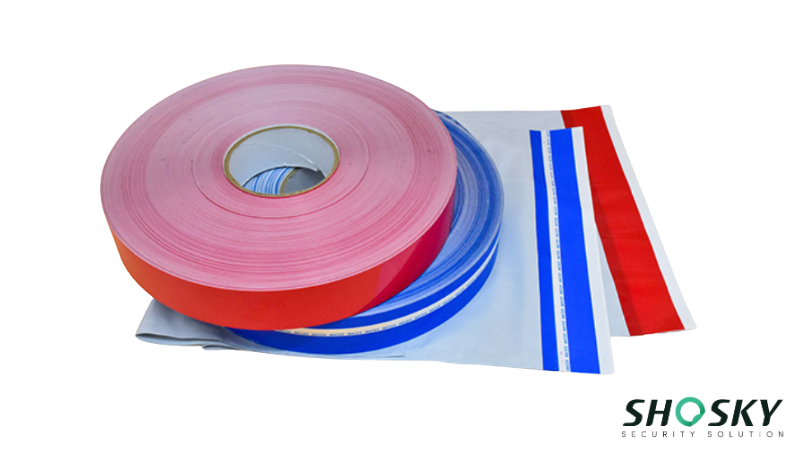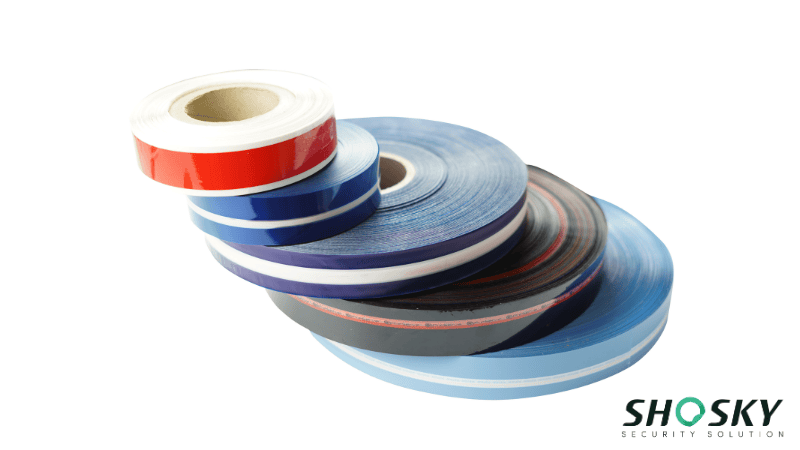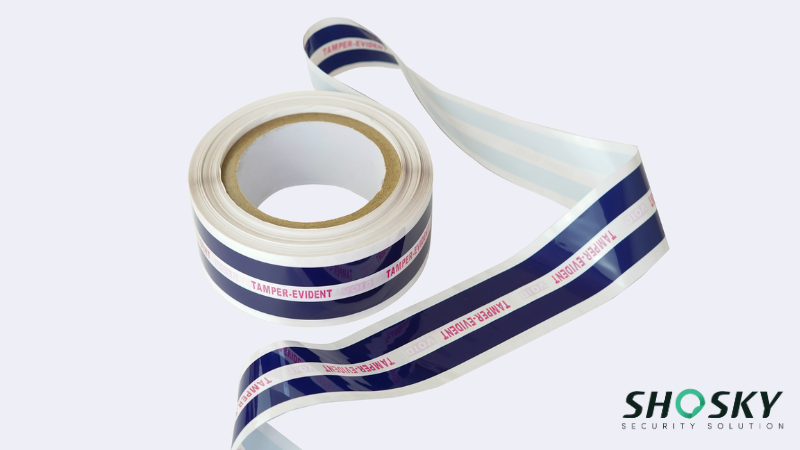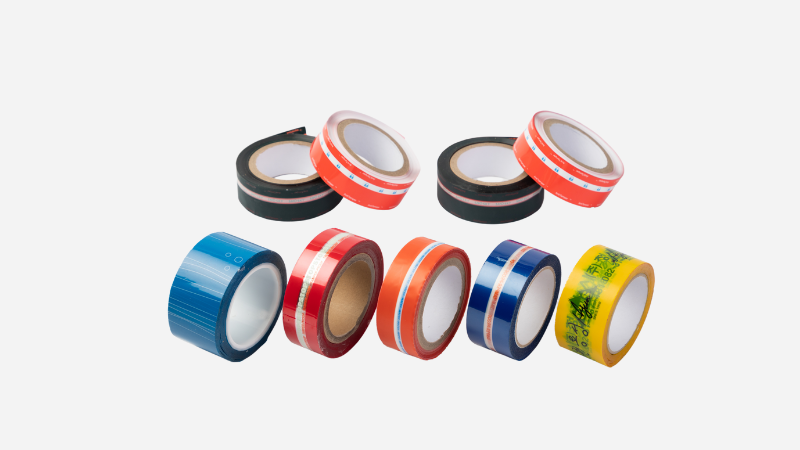Containers and packaging make up over 28% of municipal solid waste in the U.S. every year. While paper-based packaging and cardboard are commonly recycled, most security tape, especially plastic-based ones, complicate the recycling process.
However, innovation is pushing forward. Many brands now offer recyclable tamper-evident bag tape without compromising on security features. In this article, we explore whether recyclable tamper-evident bag tape exists and how businesses can align secure packaging with sustainable practices.
What Is Tamper-Evident Bag Tape and Why Is It Important?

Tamper-evident bag tape is a special kind of security tape that makes any tampering instantly visible. It often leaves a void message or a clear security message when peeled off.
The security bag tape comes in different sizes, materials like paper or plastic, and can include features like QR codes or brand logos. Its importance lies in protecting product integrity.
In sectors like e-commerce, cannabis, and medical, maintaining secure and authentic packaging is critical. Tamper-evident tape helps deter theft, prevents contamination, and ensures that what the consumer receives is exactly what the business intended to deliver.
For these industries, it’s not just about security—it’s about trust, safety, and complying with strict regulations.
Can Tamper-Evident Bag Tape Be Recycled?
Tamper-evident bag tape is typically made from materials like BOPP (Biaxially Oriented Polypropylene), PET (Polyethylene Terephthalate), and vinyl. These materials provide strong adhesion and durable security features. They are popular because they offer unparalleled security for tamper-evident bags and security labels.

Despite their benefits, these tapes present recycling challenges. Many tapes are made with mixed layers or strong adhesives that stick firmly to packaging like cardboard boxes or plastic bags.
This makes separation difficult during the recycling process, often leading to contamination of recyclable materials. Adhesives and embedded features like QR codes or printed logos add complexity, reducing the tape’s recyclability.
Regional Recycling Rules and Facility Capabilities
Recycling guidelines for tamper-evident bag tape vary widely depending on the region and the recycling facilities available.
- Some recycling centers accept plastic tapes such as BOPP and PET only if removed cleanly from the packaging.
- Others may reject packages with tape altogether to avoid contamination.
- Paper-based tamper-evident tapes tend to be more eco-friendly and easier to recycle alongside paper-based packaging.
Businesses should check with local recycling authorities to understand which types of security tape and tamper-evident bag tape are accepted. Adopting tapes made from recyclable materials or those designed for easy removal supports sustainability and reduces waste without compromising on product protection and security.

Types of Eco-Friendly Tamper-Evident Tape Options
With growing focus on sustainability and environmental responsibility, brands are seeking tamper-evident tape options that combine security with eco-friendly materials. Several innovations offer effective protection while supporting the recycling process.
Recyclable Materials
Mono-material PET-based tapes stand out as a recyclable tamper-evident bag tape option. Using a single plastic type, they simplify recycling and maintain strong adhesion and clear void messages. This makes them ideal for businesses that want both product authenticity and sustainable tamper-evident packaging.
Biodegradable or Compostable Tape Innovations
Biodegradable and compostable tapes, made from natural polymers or plant-based materials, break down in composting facilities. While security features continue to improve, these tapes help reduce waste and lower the environmental impact across the supply chain.

Water-Based or Solvent-Free Adhesive Options
Water-based and solvent-free adhesives minimize harmful emissions and ease tape removal during recycling. They provide strong bonds necessary for tamper-evident security while supporting eco-friendly materials and sustainable practices.
Paper-Based Tamper-Evident Tape Alternatives
Paper-based tapes are fully recyclable with cardboard and other paper packaging. They offer strong adhesion and visible tampering indicators, such as clear void messages, making them a preferred choice for brands that prioritize both security and environmental responsibility.
Choosing the right eco-friendly tamper-evident tape helps businesses balance security and sustainability. Whether through recyclable materials, compostable options, or innovative adhesives, these alternatives contribute to reducing waste and supporting greener packaging without compromising on protection or product integrity.
Sustainable vs. Traditional Security Bag Tape: A Comparison

When choosing between sustainable and traditional security bag tape, businesses must consider multiple factors. These include the tape’s material, environmental impact, performance in tamper resistance, cost, and compliance with industry standards. Understanding these differences can help brands make informed decisions that balance security with environmental responsibility.
Sustainable security bag tapes provide a promising path toward greener packaging without sacrificing protection. While traditional tapes still lead in performance and cost, eco-friendly alternatives are rapidly improving, helping businesses reduce their environmental impact and meet growing consumer demand for sustainable practices.

Pros and Cons of Using Sustainable Security Tape
As more businesses prioritize environmental responsibility, sustainable security bag tapes have become a key focus. These tapes offer clear environmental benefits, but they also come with some trade-offs in performance and cost. Understanding these pros and cons can help companies align their packaging choices with their ESG (Environmental, Social, and Governance) goals and green certification programs.
Pros
- Environmental Benefits: Sustainable tapes have a significantly lower carbon footprint and reduce landfill waste due to recyclability or biodegradability.
- Supports Green Certification: Using eco tapes can contribute to corporate ESG targets and green certifications, enhancing brand reputation.
- Consumer Appeal: Growing consumer demand for eco-friendly materials means sustainable tape can boost customer trust and loyalty.

Cons
- Durability and Tamper-Resistance: Some eco tapes may not yet match the unparalleled security and strong adhesion of traditional plastic tapes.
- Higher Cost: Sustainable tapes often come with a higher price due to newer materials and manufacturing processes.
- Availability: Eco-friendly options might have limited design options, sizes, or stock, impacting convenience for businesses with diverse packaging needs.
Choosing sustainable security tape is a balance. For companies committed to reducing their environmental impact and promoting sustainable practices, these tapes offer a meaningful option. However, businesses should carefully evaluate performance needs and cost factors to ensure their packaging remains both secure and eco-friendly.
How to Choose the Right Eco-Friendly Security Tape Supplier?
Selecting the right supplier is crucial for businesses aiming to combine security with sustainability. The right partner ensures the tape meets both environmental goals and performance standards. Asking the right questions and evaluating supplier capabilities can lead to a successful, eco-friendly packaging solution.

Here are some key questions to ask:
- Material Sourcing: Where do they source their materials? Are they using recyclable tamper-evident bag tape, paper-based packaging, or biopolymers? Transparency here is key to ensuring environmental responsibility.
- Certifications: Does the supplier hold recognized certifications like FSC (Forest Stewardship Council) or ISO 14001 for environmental management? Certifications demonstrate a commitment to sustainable practices.
- Customization Options: Is custom printing on tamper-evident bag tape, such as your brand logo, security message, or even QR codes, possible? Look for suppliers offering design options that support both branding and eco-friendliness.
To make an informed decision, it’s essential to evaluate each supplier’s transparency, certifications, and customization capabilities. By asking the right questions, you can identify a partner who supports both operational excellence and eco-conscious packaging strategies.
Best Practices for Implementing Recyclable Tamper-Evident Bag Tape
Implementing recyclable tamper-evident bag tape is a strategic move toward enhancing security while aligning with sustainability goals. A successful rollout requires careful planning, cross-functional collaboration, and clear metrics for tracking performance. Below are the best practices for implementation:
Pilot Program Implementation

To ensure a smooth transition, begin with a controlled pilot program. The scope of this pilot should be clearly defined, targeting specific SKUs, packaging formats, or shipping lanes where tamper-evident solutions are most critical. Focusing on regions with established recycling infrastructure enhances the feasibility and measurement of results.
Shipments selected for the pilot should be prone to tampering, subject to high return rates, or distributed through complex logistics networks. These conditions allow for meaningful data collection and stress-testing of the tape under real-world scenarios.
Success metrics for the pilot phase should include:
- Adhesion performance during storage and transport,
- Clarity of tamper evidence (e.g., visible void patterns upon removal),
- Recyclability as verified by third-party recycling facilities or guidelines.
SOP Updates and Change Management
Introducing recyclable tamper-evident tape will likely require updates to existing packaging Standard Operating Procedures (SOPs). Also, it’s essential to conduct a comprehensive review of workflows to identify processes affected by the new material.

Revised procedures should specify the type of tape to be used, proper application methods, and removal steps that preserve both tamper evidence and recyclability. Visual guides and hands-on training are strongly recommended to minimize application errors.
All SOP changes must go through a formal approval process and be subject to version control. Ensure that updated procedures are accessible across all relevant departments, with training provided to warehouse, quality control, and logistics teams.
Ongoing Monitoring and Performance Measurement
Post-implementation, robust monitoring is essential to track adoption and identify improvement areas. Key performance indicators should include:
- Tape usage by SKU or fulfillment center,
- The rate of successful recycling or material recovery,
- Incidence of tape failure or tamper-evidence malfunction.
Data should be collected using a combination of shipment tracking systems, on-site observations, staff surveys, and recycler feedback. This multi-source approach ensures a comprehensive understanding of operational performance and environmental impact.
A continuous-improvement loop should be established, with regular reviews every four to six weeks. Feedback from all stakeholders should be used to refine materials, update SOPs, and scale the program more broadly with confidence.

FAQs
Are there biodegradable tamper-evident tapes on the market?
Yes, biodegradable tapes made from natural materials exist and break down safely, offering eco-friendly tamper protection.
Will recyclable security tape perform as well as standard tape?
Most recyclable tapes now offer strong adhesion and good tamper resistance, similar to traditional tapes.
Can eco-friendly tape meet cannabis and pharmaceutical compliance rules?
Yes, many eco-friendly tapes meet industry security and compliance standards for these sectors
Conclusion
Traditional security tapes often rely on plastics that contribute to waste. Their limited recyclability adds to environmental challenges faced by many industries today. Thankfully, the market is shifting toward recyclable and sustainable tamper-evident tape options made from eco-friendly materials like paper and biopolymers. These alternatives offer effective security features while reducing environmental impact.
Explore Smarter, Greener Packaging with Shosky
At Shosky, we combine security with eco-friendly materials to deliver recyclable tamper-evident bag tape and sustainable packaging solutions. Contact us today and take the first step toward a more sustainable future.

